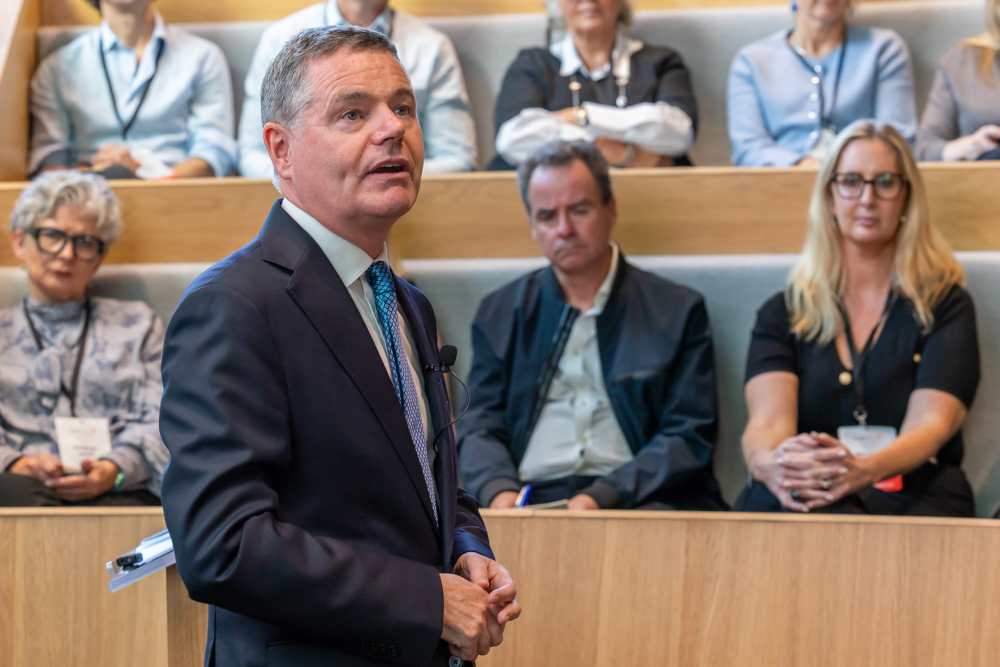Ireland targets 300,000 new jobs and productivity gains with new Competitiveness Action Plan.
The Irish Government today (10 September 2025) unveiled a strategic Action Plan for Competitiveness and Productivity aimed at bolstering the country’s economic resilience and positioning Ireland as a leading destination for indigenous enterprise and foreign investment.
The plan, published by the Department of Enterprise, Trade and Employment, outlines a series of policy measures designed to enhance Ireland’s business environment, support innovation, and improve productivity across sectors.
“We must keep a laser focus on competitiveness and innovation over the next five years”
It forms part of the government’s broader ambition to create 300,000 additional jobs by 2030.
“We must keep a laser focus on competitiveness and innovation over the next five years,” the report states, citing the need to reduce costs, streamline bureaucracy, and invest in infrastructure to sustain economic growth.
Reforms needed
Key pillars of the plan include reforms to tax and wage policy, improved access to finance, and targeted investment in education, energy, and digital infrastructure. The Government also intends to publish a long-term enterprise strategy, Enterprise 2035, to guide policy development and stakeholder engagement.
The plan emphasises Ireland’s commitment to participating in Important Projects of Common European Interest (IPCEI), shaping EU competitiveness policy, and supporting open trade. It also includes measures to ratify the Comprehensive Economic and Trade Agreement (CETA) and deepen integration within the EU Single Market.
In a bid to support regional development, the Government will launch new enterprise plans tailored to local needs and establish five cluster organisations to foster collaboration between businesses, academia, and public agencies.
The National Standards Authority of Ireland (NSAI) will undergo reform to align Irish certification processes with EU standards, facilitating market access and regulatory compliance for domestic firms.
The plan also includes a Modern Methods of Construction (MMC) Innovation Fund, backed by the Ireland Strategic Investment Fund (ISIF), to accelerate housing delivery and promote sustainable building practices.
Financial institutions are expected to play a key role in supporting the transition. Bank of Ireland and other lenders are developing green finance products and sustainability-linked loans to help businesses align with national decarbonisation targets.
The Government’s approach reflects growing recognition that competitiveness and productivity are central to Ireland’s long-term economic success. The plan signals a shift toward more coordinated, data-driven policymaking, with a focus on inclusive growth and regional balance.
But what do industry leaders think of the plan?
Cost of doing business
“We now have a plan but delivering on its objectives will be paramount to its success,” said Chambers Ireland CEO Ian Talbot. “Competitiveness should relentlessly focus on delivering infrastructure, easing the cost of doing business, keeping goldplating to a minimum when implementing or transposing legislation, reducing the regulatory burden for companies and helping deliver new opportunities.
“We particularly support the renewed focus on the Accelerating Infrastructure Taskforce and the commitments for increased resources for the courts system. Rapidly delivering infrastructure will be essential to support the daily operations of businesses while also helping indigenous companies to scale without constraint. It will be equally important in further attracting investment, particularly as AI and other innovative technologies now constitute the next wave of FDI.
“The commitments to completing the Single Market, advancing skills initiatives, and enhancing the R&D Tax Credit are steps in the right direction, as are the commitments to review initiatives like the Employment Investment Incentive Scheme and the Key Employee Engagement Programme. These are all actions which we have consistently called for in recent years to help businesses remain competitive.
“Any such reviews must lead to tangible outcomes, with clear timelines and accountability to ensure that they deliver real improvements for businesses and the wider economy.”
He noted that some important priorities were overlooked: “We would have liked to see a clear commitment to holding a referendum on the Unified Patent Court (UPC). Doing so would be a decisive step in ensuring more businesses here have increased access to more affordable patent protection. We are also disappointed that there was no commitment to advancing Free Trade Agreements, such as Mercosur, which are critical to opening new markets and supporting growth at a time of global uncertainty.”
Funding challenges for scaling businesses
From an initial reading of the 132-page report, Scale Ireland said it welcomes the commitment to tackle Ireland’s scaling funding gap which a recent report (commissioned by the Government) suggested would be €1.1bn over the next three-to-five years.
“So Scale Ireland welcomes the specific commitment for policy actions that will incentivise pension fund and institutional investor participation into scaling equity funds, the establishment of a SME Scaling Fund, and a review of tax measures to incentivise investment into start-up and scaling companies,” said Scale Ireland CEO Martina Fitzgerald.
“It is critical that Ireland solves its funding challenges if we are to meet the ambitious targets set out in Enterprise Ireland’s new Enterprise Strategy.
“Scale Ireland also welcomes the commitment to the simplification of state supports in the Plan, which specifically references the findings of Scale Ireland’s State of Start-up Survey in this key area. This is a significant issue for start-ups and scaling companies which do not have the resources to navigate complex schemes and initiatives. Despite some efforts made in this regard in recent years, progress has been painfully slow.
“Proposals to set up a National Artificial Intelligence Office (NAIO), which will drive innovation and uptake in AI and act as the central co-ordinating authority for the EU AI Act, are positive. We will seek further information and consultation on this, as well as the proposal to set up a central coordinating body, Start-up Ireland, and clarify what its relationship will be with existing bodies in the sector.
“For Scale Ireland, the key, as always, will be implementation.”
Tackling infrastructure and rising costs
Dublin Chamber welcomed the Government’s Action Plan on Competitiveness and Productivity, but warned that rising business costs, regulatory burdens and ongoing infrastructure delays are putting Ireland’s competitiveness at risk.
Dublin Chamber CEO Mary Rose Burke said: “The Action Plan is a positive step and signals real ambition from Government. It is long on commitments and short on concrete deadlines. However, the reality is that businesses are already feeling the strain. High input costs, growing regulatory pressures and planning delays are eroding competitiveness and threatening Ireland’s ability to attract and retain investment.”
The Chamber said the commitments to reduce costs, cut red tape and support SMEs are important, but stressed that delivery must be immediate and measurable.
Burke added: “Our members welcome initiatives such as the Small Business Unit and Cost of Business Advisory Forum, but firms cannot wait years for progress. There are similar bureaucratic delays in delivering infrastructure. Unless timelines are accelerated and barriers removed, these challenges will continue to undermine Ireland’s competitive position.”
Dublin Chamber also called for closer alignment between the new Action Plan, the National Development Plan and the upcoming Budget to ensure joined-up action on housing, energy, skills and transport.
Burke said: “Government has set out a plan to “control the controllables” in terms of planning bottlenecks, onerous regulations from State Bodies and increases in Taxation. Now it must be backed up by delivery, accountability and urgency. Ireland’s competitiveness cannot be taken for granted.”
Getting Ireland ready for the AI age
Digital Business Ireland (DBI welcomed the Government’s plans to establish a new National AI Office and to introduce tax measures to support the adoption of innovative technologies for SMEs.
But DBI has warned that the new National AI Office must not lead to duplication or fragmentation in term of Government AI policy and regulation and the delivery of AI supports for businesses in Ireland. The Association also called for the proposed tax measures set out in today’s Action Plan to be fully implemented in Budget 2026.
“Digital Business Ireland has been consistent in calling on Government to do more to help businesses to meet the costs of digital transition, including through tax incentives,” said Digital Business Ireland Chair, Caroline Dunlea. “Digital transition is simply not happening fast enough and he digital intensity of much of Ireland’s real economy, particularly among our SMEs, remains low.”
“The new proposal for tax measures for adoption of innovative technologies is very welcome and could support Irish businesses to accelerate their digital transition, including leveraging the benefits of AI. But an Action Plan is no good unless it’s implemented. It is critically important that this proposal is implemented in the upcoming Budget.”
She continued: “Digital Business Ireland and others have repeatedly called for a new National AI Office in order to deliver consistency, coherence, and coordination in Government AI policy, so as to support the effective adoption of AI in Ireland and the growth of Ireland’s digital economy.
“To deliver on this ambition, the planned new office must be at the heart of a streamlined approach. Its role and relationships with other state agencies and regulators must be clear and must avoid simply adding another layer of bureaucracy or regulation to an already overcrowded field. Most important, the new National AI Office must have a clear mandate to support businesses in Ireland and the growth of Ireland’s digital economy.”
-
-
Bank of Ireland is welcoming new customers every day – funding investments, working capital and expansions across multiple sectors. To learn more, click here
-
For support in challenging times, click here
-
Listen to the ThinkBusiness Podcast for business insights and inspiration. All episodes are here. You can also listen to the Podcast on:
-
Spotify
-
SoundCloud
-
Apple
-




